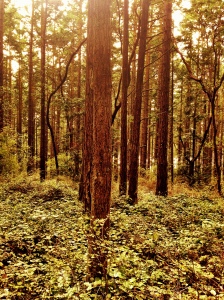It's not happiness that makes us grateful. It's gratefulness that makes us happy. David Steindl-Rast The wheelbarrow dropped into a rut and I rammed it through the mud, cursing. My lower back would pay for that pig-headed push. While waiting for the next dump truck load of soil, I squatted in catcher's pose and poked strawberry plant runners through a weed barrier cloth. I yanked weeds and tossed centipedes from kale. I ate a warm, homemade brownie with my gloves on, smearing my teeth with chocolate and dirt. My nose was running, my left sock had skidded down my Wellington boot to my heel, and I had to pee.
Two hours later, I folded my aching limbs into the front seat of the car, peeled off my work gloves, and proudly displayed for my husband the fiery red spots that pulsed on my fish-belly white palms—blisters in the making from shoveling dirt into that wheelbarrow and spreading it over sheets of cardboard as I helped prep a new bed in a food bank community garden. I was happy. Quietly, sweetly, content.
Where did that simple happiness come from? Giving a few hours to my community? Hanging out with a group of kind, funny, hardworking people? Being outside on a blustery, sharp spring day? The raw and clean exertion? Of course. Maybe. Probably not. These were all ancillary conditions to what was really going on. And what was really going on was me, existing one hundred percent in the moment.
A couple of weeks ago, I listened to this podcast: Simply Happy: TED Radio Hour, which synthesizes several TED talks on the concept of happiness. In one, psychologist and biomedical engineer Matt Killingsworth tells his audience the secret of happiness. It's the real deal, folks—he did a slew of research, crunched a bunch of numbers, and it all comes down to this: we're happiest when we live in the moment. When our minds don't wander. When we lose ourselves in an activity, we find our bliss.
On the other side of the Matt Killingsworth hard data approach is the Benedictine monk David Steindl-Rast, who also believes that happiness is found by living in the moment. But he takes the process a few steps beyond. He tells us to Stop. Look. Go. First, be in our moment, then recognize it as an opportunity, and finally, go forward with gratitude. Steindle-Rast does not offer false platitudes about gratefulness for the horrible things that happen in life, but he explains how people who suffer terrible loss can also be those who discover transcendent joy.
I'm lousy at this being in the moment business. My brain flies in seventy-five directions at once as I brood over my recent stumbles and fret about the hurdles yet to jump. But there are times, like the hours I pushed that wheelbarrow and shovel around the community garden, when I am nothing but a mass of breathing peace and awareness. Those hours were a gift and I felt the gratitude of the moment.
As I listened to this podcast, the bell of recognition chimed low and sonorous. I'm happiest when I write. Of course. Not grinning ear to ear, giddy, playful Happy, but present, focused, immersed in the moment Happy. Shoveling compost in the garden Happy. I'd go so far as to dispense with the notion of Happiness altogether and call it the even more desirable state of Fulfillment. And, I am grateful.
I agonize about the future, the certainty of failure, the choices that push their way to the surface—some weeds, others nourishment—yet, I need to remember that cultivating gratitude is priority number one. Not success or achievement, but the recognition of opportunity each moment brings.
Do I write because being published makes me happy? Certainly, it's thrilling and validating. But does it make me happy? Hmm ... no. The acceptance of a piece of work is fleeting pleasure. The happiness, the Matt Killingsworth-I've-got-the-data-to-prove-it Happiness, comes from the being present in the process. And from recognizing the joy the act of writing brings. In the end, that's got to be enough.
Stop. Look. Go. Change your world one moment at a time by being grateful for the moment you are in.


